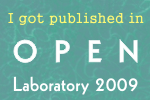Mozilla does scientific matchmaking between programmers and researchers
Mozilla Science Labs are looking top pair programmers and scientists. If you are a scientist in need of a programmer, read the following, and then go to the website to see how to take it further. Thanks to Miami University’s Office for Advancement of Research and Scholarship for bringing this to my attention.
Interdisciplinary Programming is looking for research projects to participate in a pilot study on bringing together the scientific and developer communities to work together on common problems to help further science on the web. This pilot will be run with the Mozilla Science Lab as a means of testing out new ways for the open science and open source community to get their hands dirty and contribute. The pilot is open to coders both within the research enterprise as well as those outside, and for all skill levels.
In this study, we’ll work to break accepted projects down to digestible tasks (think bug reports or github issues) for others to contribute to or offer guidance on. Projects can be small to mid-scale – the key here is to show how we can involve the global research and development community in furthering science on the web, while testing what the right level of engagement is. Any research-oriented software development project is eligible, with special consideration given to projects that further open, collaborative, reproducible research, and reusable tools and technology for open science.
Candidate research projects should:
- Have a clearly stated and specific goal to achieve or problem to solve in software.
- Be directly relevant to your ongoing or shortly upcoming research.
- Require code that is sharable and reusable, with preference given to open source projects.
- Science team should be prepared to communicate regularly with the software team.
Interdisciplinary Programming was the brainchild of Angelina Fabbro (Mozilla) and myself (Bill Mills, TRIUMF) that came about when we realized the rich opportunities for cross-pollination between the fields of software development and basic research. When I was a doctoral student writing analysis software for the Large Hadron Collider’s ATLAS experiment, I got to participate in one of the most exciting experiments in physics today – which made it all the more heartbreaking to watch how much precious time vanished into struggling with unusable software, and how many opportunities for great ideas had to be abandoned while we wrestled with software problems that should have been helping us instead of holding us back. If we could only capture some of the coding expertise that was out there, surely our grievously limited budgets and staff could reach far further, and do so much more.
Later, I had the great good fortune to be charged with building the user interface for TRIUMF’s upcoming GRIFFIN experiment, launching this month; thanks to Angelina, this was a watershed moment in realizing what research could do if it teamed up with the web. Angelina taught me about the incredibly rich thought the web community had in the spheres of usability, interaction design, and user experience; even my amature first steps in this world allowed GRIFFIN to produce a powerful, elegant, web-based UI that was strides ahead of what we had before. But what really struck me, was the incredible enthusiasm coders had for research. Angelina and I spoke about our plans for Interdisciplinary Programming on the JavaScript conference circuit in late 2013, and the response was overwhelming; coders were keen to contribute ideas, participate in the discussion and even get their hands dirty with contributions to the fields that excited them; and if I could push GRIFFIN ahead just by having a peek at what web developers were doing, what could we achieve if we welcomed professional coders to the realm of research in numbers? The moment is now to start studying what we can do together.
We’ll be posting projects in early July 2014, due to conclude no later than December 2014 (shorter projects also welcome); projects anticipated to fit this scope will be given priority. In addition, the research teams should be prepared to answer a few short questions on how they feel the project is going every month or so. Interested participants should send project details to the team at mills.wj@gmail.com by June 27, 2014.
Comments are closed.


















